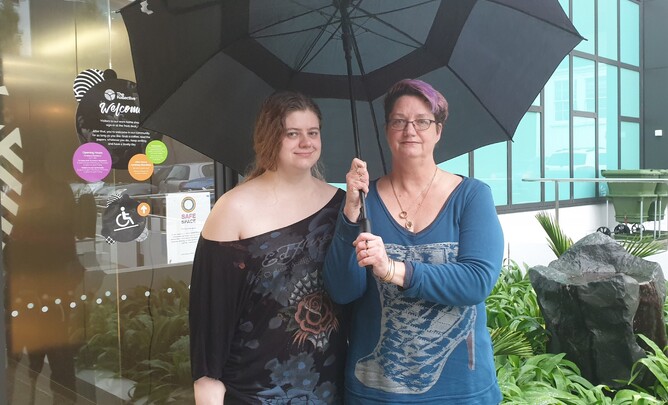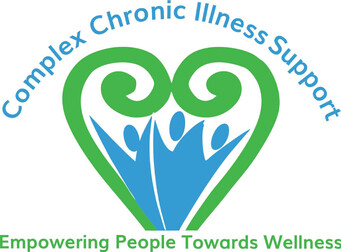There are tears in Arlene Olson’s eyes as she describes the past few years she’s been through.
“My mother died, then my sister and brother in law died, I got diagnosed with my illnesses, and now I could be losing my job because of that.”
Arlene was diagnosed in June with Chronic Fatigue Syndrome, Myalgic Encephalomyelitis, and Fibromyalgia. They’re not well known, but they are lifelong conditions that are often debilitating, and invisible to the world.
Arlene has lived with them for around ten years. She describes the symptoms as like having a constant flu.
“I can’t control my body temperature, I can’t breathe properly, I have no energy, I get extremely shaky and dizzy, and I’m in constant pain – it’s like there are metal rods jabbing into my muscles.”
Only recently with the stress of the family deaths have the symptoms become unbearable and she’s crashed. Now, she is struggling to get back up.
With her sick days racking up, her employer has become concerned that she is taking too much time off, and could now face losing her job. Arlene says it feels like she is being constantly judged.
“I feel like many people, including my employer, think I am just lazy, or neurotic. It’s a daily battle – not just with the pain and constant exhaustion, but with the judgement from others.
“I love my job, I love keeping busy, but everything takes so much energy. I struggle to make my bed, if I get in the shower I’m wiped out for the rest of the day. It’s difficult for people to understand – I honestly feel like I’m missing out on life.”
But one local charity is offering Arlene the much-needed understanding, knowledge, and guidance she needs to keep striving towards wellness.
Complex Chronic Illness Support (CCIS) work to improve the quality of life of people who have complex chronic illnesses. They support, connect, advocate for and educate people diagnosed with Myalgic Encephalomyelitis, Chronic Fatigue Syndrome, Fibromyalgia, and Postural Orthostatic Tachycardia Syndrome.
These illnesses have an element of chronic muscular and nerve pain and affect between two to four people in every 1,000 of the population. The effects of a complex chronic illness are many and can include extreme fatigue, pain, concentration and memory dysfunction, sleep disorder, and headaches.
Arlene is currently being supported by CCIS WBOP Field Officer Charlotte Kelp, who also lives with a complex chronic illness, and provides the mental support Arlene needs to stay positive.
“Charlotte rings me at home to check I am ok, she is teaching me how to pace myself, how to not give myself such a hard time, and how to live with this. She is advocating for me at my work to try and help them understand my illnesses, and she is looking into WINZ to see what support I can get if I do lose my job.
“If I didn’t have CCIS and Charlotte’s support, I don’t know if I would still be here today. The mental and physical toll of these illnesses can kill. It is a blessing that I found them.”
CCIS offer a range of services including support groups, educational speakers, mindfulness workshops, home visits, one-on-one support, and a Towards Wellness workshop series.
Miranda Whitwell, Operations Coordinator at Complex Chronic Illness Support, says the positive difference their service has on members, their carers, and whanau is often described as life-changing.
“Not only are members supported to gain an in-depth understanding of their illness, but they gain a whole new family of other members who understand what they are going through – they feel connected, listened to and validated.
“With our education and guidance, many people who develop complex chronic illnesses can pursue a fulfilling and rewarding life and are once again able to actively contribute to their community.”
CCIS sought funding through the WBOP COVID-19 Recovery Fund to help top up the wage subsidy and cover wages for their full-time staff members for three months.
The $14,540 received is ensuring their staff can continue supporting their 218 clients with home visits, phone contact, support groups, and workshops.
The Recovery Fund is phase two of local funders TECT, Acorn Foundation, BayTrust and Tauranga City Council’s COVID-19 funding support. The fund aims to help key Western Bay of Plenty community groups survive the medium-term impact of COVID-19.
Miranda says the Recovery Funding has allowed Complex Chronic Illness Support to keep their doors open until their funding partners around New Zealand are able to open up funding rounds again.
“With Covid-19 hitting the world, funding dissipated for charities almost overnight. As a charity, we feel we are constantly asking our funding partners for support and 2020 threw them an unexpected curve ball too.
“Every day we work alongside people like Arlene, who struggle daily with meeting the demands of their employment because of life changing health concerns. Being able to offer them support in their time of need, when life is really hard, brings its own rewards.
“Many of the conditions we support are not publicly funded, there is no magic pill to deal with their symptoms. New Zealand still does not recognise Chronic Fatigue Syndrome (CFS/ME) as a disability, therefore we often don’t qualify for other funding streams. But the work we do and the difference made in people’s lives is worth every time we have to ask, beg even.
“We were extremely grateful that the Recovery Fund came to our rescue, it has given us a reprieve, time to take stock, re-evaluate and move forward. We are very grateful.”





